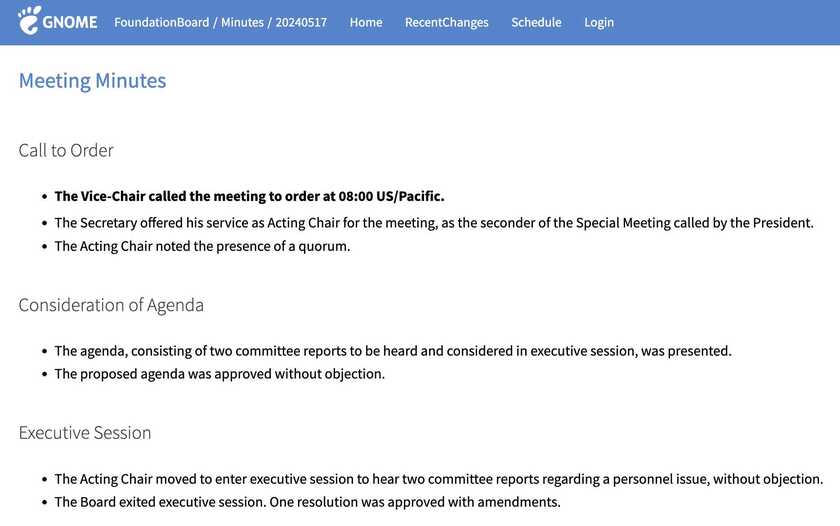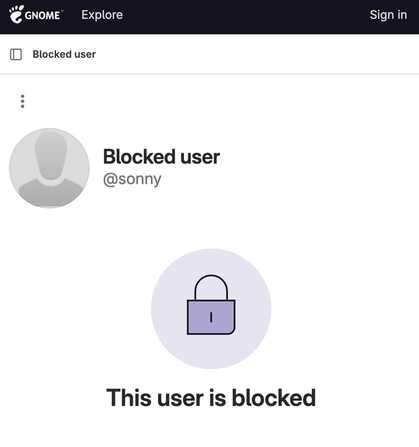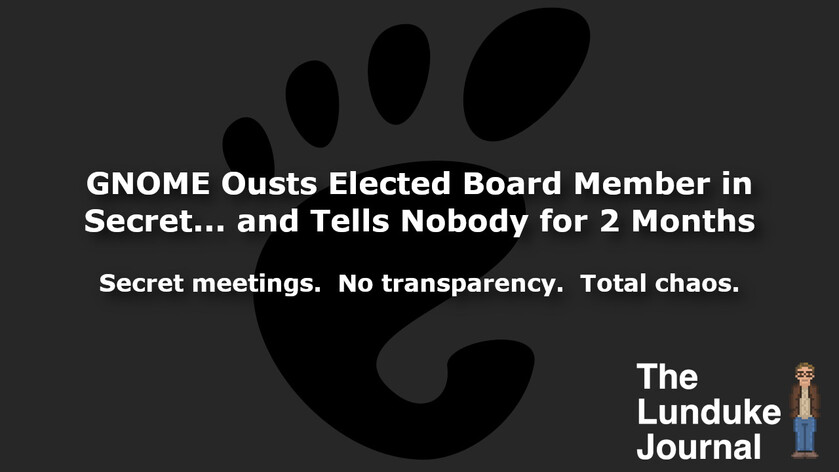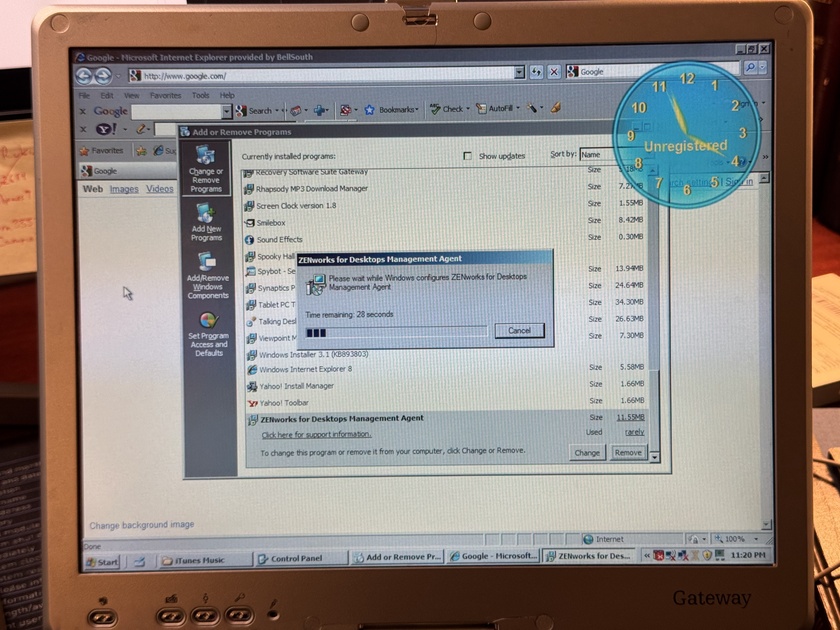The chaos at the GNOME Foundation continues, as it is revealed that an elected GNOME Board member was forced out in a secret meeting... held two months ago, but withheld from the public until now.
Chaos and Secrecy within GNOME
As you may remember, GNOME recently announced that they were in dire financial circumstances... followed immediately by the resignation of their Executive Director (who had only been on the job for 9 months, with almost nothing to show for her time).
Now, the GNOME Foundation Board has announced that they have removed one of their recently elected Board Members... in a "Special Meeting"... held on May 17th.
Yet this fact was kept secret until July 17th -- two months later -- when they made the following statement:
"The GNOME Foundation Board voted to remove Sonny Piers as a member of the Board of Directors for cause, at a Special Meeting on May 17th, 2024, following the procedure outlined in the GNOME Bylaws, and remove him from all committees. Effective May 25th, 2024, his seat is now vacant, and in accordance with the Bylaws will be filled for the remainder of its term by an appointment made by the Board.
A Code of Conduct complaint was also made against Sonny Piers. The Foundation is engaged in a mediation process with him, which is still ongoing and so we are unable to share more information at this time."
Sonny Piers, first elected less than a year earlier, was forced out of his seat on the GNOME Board. Unexpectedly.
Why? That information is not provided. In fact the meeting minutes for this May 17th "Special Meeting" are incredibly vague... providing almost zero information.
Almost total secrecy about the reason for this Board Member being forced out of the GNOME Foundation.

This forced removal was not limited to the seat on the GNOME Board... the GNOME accounts of Sonny Piers all have (seemingly) been blocked or banned. Including source control.

Who is Sonny Piers?
There are multiple things which makes this incident extremely peculiar. Not least of which is the fact that Sonny Piers is one of the most effective and prominent members of the GNOME project: Being the creator and developer of GNOME Workbench, and one of the orchestrators of the 1 Million Euro Sovereign Tech Fund grant from late last year (one of the only pieces of positive news from GNOME in quite some time).
If you were to create a list of the 5 most important, influential, and effective people within GNOME... Sonny Piers would make that list. Easily.
According to a July 21st statement from Sonny Piers, his ousting from the GNOME Board was a "shock" to him:
"I am no longer a member of the board of directors of the GNOME Foundation since May 2024. The process and decision shocked me. I know people are looking for answers, but I want to protect people involved and the project/foundation. It was never an interpersonal conflict for me."
While we can read between the lines on some of this statement... there are very few details here about what, exactly, transpired.
GNOME Does Damage Control
After this news began to spread within the GNOME world (and after The Lunduke Journal reached out to him for comment), the GNOME Foundation President, Robert McQueen was forced to make a public statement:
"This has also been an unprecedented situation for the Foundation. The Directors have met 15-16 times this year so far already and directed a great deal of time and attention into making this decision and trying to find the least worst outcomes, considering our legal and moral obligations to the community, the staff, and the Foundation — obligations which have sometimes felt in tension."
Least worst outcomes? Legal and moral obligations?
A secret vote to oust an elected official. Followed by keeping it a secret from the voters. How is that a "moral obligation"?
While we're not getting many details from GNOME about why they ousted an elected Board member... the words chosen raise many, many additional questions.
"Regarding the Board decision; whilst the Board did receive a report from the CoCC, removal of a Director is a separate process as set out in the Bylaws and solely at the authority of the Board. The Board considered it separately and independently as we are required to do, and made our own autonomous decision by a significant majority. We took outside legal advice on the situation and the process at multiple points, and it was duly followed. For the purposes of limiting legal liability, that advice also included making the announcement very terse and factual. I appreciate this is at tension with the transparency that the community would hope to see, but Directors are also obligated to look after the Foundation’s legal requirements and financial interests."
We know that the GNOME "Code of Conduct Committee" was involved in some way.
According to that "Code of Conduct Committee" there were only two "incidents" which were "actionable". Based on their reporting (which is incredibly vague and secretive), that incident would be one of the two items listed in this report.

No names. No details. Complete secrecy.
Likewise, outside legal counsel was saught by the GNOME Foundation on whatever this matter was.
And why did the GNOME Foundation keep all of this a secret for two months? Their statement on the matter seems rather... weak.
"Regarding the timing; the previous Board was intentionally refraining from announcements while we made arrangements for mediation mentioned in the announcement. Subsequently during the election period we did not want to appear to be interfering in the election which runs autonomously with its own timeline, and since the election the new board has only had its first official meeting (i.e., duly notified, with quorum, able to make votes) to approve this announcement on Wednesday before GUADEC."
To be clear: The GNOME Foundation subverted the votes of the GNOME Foundation Members, by ousting an elected board member (in secret)... and the reason they didn't tell anyone about it for two months is... that they were making "mediation arrangements"?
And they only, just now, felt the need to tell people what they had done... because people would find out anyway at their annual conference (GUADEC)?
Seriously?
I'll be honest here... I don't buy it. The GNOME statement, quite simply, doesn't hold water.
So Many Questions
These events raise so many questions and concerns regarding the GNOME Foundation.
- Why was Sonny Piers ousted from his elected seat on the GNOME Foundation Board?
- Why was this action done entirely behind closed doors, with absolutely zero documentation regarding this vote?
- Why was this undocumented vote, in this "Special Meeting", kept secret for two months?
- Why does GNOME only feel the need to tell people what actions they take, in secret, when their secret activities are on the verge of being discovered?
- Why was "legal advice" necessary?
- Does the ousting of Sonny Piers have anything to do with the other events happening within GNOME during the same time period (the removal of the "GNOME Shaman" Executive Director, the massive flop of the "5 Year Plan", and the announcement of financial difficulties)?
Will GNOME answer any of these questions? If their past (and current) dedication to secrecy are any indication... probably not. Heck. GNOME bans critical tech journalists from even asking questions in their forums.
Thoughts From Lunduke
If I were a voting member of the GNOME Foundation, I would find this all deeply troubling.
If the GNOME Foundation can get rid of undesirable board members -- 100% in secret, without ever giving justification... and not even telling GNOME voters that they did it for multiple months -- then that means GNOME Members have absolutely no power within the Foundation. Their votes simply do not matter.
It should be noted that The Lunduke Journal reached out to multiple people with questions and a request for comment on this story, including:
- The entire GNOME Foundation Board
- The GNOME Foundation Code of Conduct Committee
- Sonny Piers
Several hours after reaching out, both Sonny Piers and the GNOME Foundation President posted the statements outlined earlier in this article. Yet, as of the publishing of this article, not one representative from GNOME has directly responded. And the public statements failed to answer any of the questions asked above.
GNOME is a critically important suite of software -- used by numerous prominent, consumer-focused, open source operating systems... as well as relied upon by all of the major Linux Enterprise corporations. What happens to GNOME can have a significant impact on the entire Linux, BSD, and Open Source ecosystem.
The extreme levels of secrecy within the GNOME Foundation -- coupled with their repeated chaos and failures -- raises significant concerns.
The GNOME Chaos Timeline
There's so much going on within GNOME... it can be hard to keep it all straight.
Here is a timeline, covering roughly the last year, of some of the key events discussed within this article (along with some of the other events relating to the GNOME Foundation).
- June 20th, 2023 - Sonny Piers announces his candidacy for the GNOME Foundation Board.
- July 21st, 2023 - Sonny Piers won election to the GNOME Foundation Board.
- October 17th, 2023 - GNOME Foundation hires Holly Million (a professional Shaman) as the new GNOME Executive Director.
- November 9th, 2023 - GNOME 1 Million Euro grant from Sovereign Tech Fund, organized and managed in part by Sonny Piers.
- February 2nd, 2024 - GNOME Foundation in-person Board Meeting (including both Holly Million and Sonny Piers).
- April 26th, 2024 - GNOME Foundation announces spending freeze due to dire financial circumstances.
- May 17th, 2024 - At secret "Special Meeting", Sonny Piers was voted to be removed from the GNOME Foundation Board. (This was kept secret until July 17th.)
- May 23rd, 2024 - GNOME Foundation announced a "Five Year Strategic Plan" consisting primarily of DEI policies and a lack of measurable goals.
- May 25th, 2024 - The GNOME Board seat of Sonny Piers was now vacant. (This was kept secret until July 17th.)
- July 12th, 2024 - GNOME announced that the Executive Director, Holly Million, would be leaving at the end of July (after roughly 9 months in the job).
- July 17th, 2024 - The removal of Sonny Piers, two months earlier, was finally announced.
- July 19th, 2024 - GNOME holds their annual conference, GUADEC.
- July 21st, 2024 - Sonny Piers makes a statement. As does the GNOME Foundation President.
What will happen next? More chaos, disaster, drama, and secrecy? We'll find out.

















